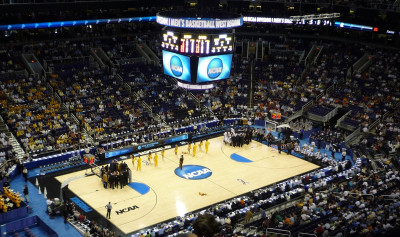
ESPN’s coverage of the college basketball opening night marathon, broadcasting 30 straight hours of basketball from across the nation, began Monday night. When I saw the lineup of games, I was excited because I have something to watch in class. And besides, there are some awesome matchups on the slate.
But then I looked at the times, and that’s when I was shocked. If I were a basketball player, I would be outraged if I had to play a game starting close to midnight or the early morning hours.
For example, Brigham Young University at California State University, Long Beach, on Monday started at 10:45 p.m. PST, while University of Wisconsin-Green Bay at East Tennessee State University will tip off at 6 a.m. EST on Tuesday.
That’s ridiculous. For the fans, it means watching basketball all day and a relatively unproductive day at work or school. But for the players, it means falling behind in classes, no sleep and little food.
The NCAA, an organization that should be creating a program to produce scholar-athletes, has become too caught up in marketing and advertisements to even care about its students anymore.
So the real question here is, are we asking too much of our student athletes? The answer is a resounding “yes.”
Back in March, John Oliver, host of HBO’s Last Week Tonight, did a special on the NCAA. During the story, the show aired a clip with former University of Connecticut guard Shabazz Napier, where he stated there are some nights during March Madness where he was unable to eat before or after the game.
This is startlingly true.
How can the NCAA let its players, who during the tournaments are given 9:20 p.m. start times, go without food for an entire night? It’s awful. This is the kind of stuff you hear about from sweatshops, not NCAA basketball.
But the problem is not only the NCAA. It’s corporate sponsorships and television.
In an era where everything seems to be on television, and digital media dominates, it’s unfair to let NCAA athletes get stuck in the middle. After all, they aren’t getting paid, but that’s an issue for another column.
This issue doesn’t just lie in basketball. Football has also seen its athletes overworked.
For example, Virginia Tech opened its season on a Monday against defending-champion Ohio State University. Five days later, the Hokies returned to the field for the second time in a week to play Furman University.
Ohio State did the same thing, playing the following Saturday against the University of Hawaii at home. Playing on short weeks has presented a problem for NFL players. But apparently, the NCAA doesn’t think the same problem exists among college athletes. After all, college athletes are younger and can play on shorter rest.
This flimsy logic is why the NCAA has deteriorated into the unethical organization it is today. Now, I’m not saying that this is specifically the NCAA’s reasoning for giving college football teams shorter rest, but again, the driving force is television deals and sponsorships.
Just a few weeks back, Seattle Seahawks cornerback Richard Sherman publicly voiced his displeasure with the phenomenon of Thursday night games. The gist of his comments was that it is unfair and unsafe to force players to play games four days apart for the sake of television.
Sherman is absolutely right.
The NCAA does the same thing, and expects its athletes to somehow maintain grades despite playing games at unreasonable times on an inadequate amount of rest. It’s a disgrace.
There is an easy solution to this issue: The NCAA has to start giving priority to the safety of its student athletes rather than its sponsors. Yeah yeah, that’s tough to do but it is something that should have already been done.
There is no reason that television is of higher importance than the safety and well-being of athletes.
The NCAA has to stop thinking with its wallet and start thinking with its mind. There is no reason to have a 6 a.m. basketball game on ESPN on a Tuesday. Instead of playing basketball, those students should be sleeping, doing homework or getting ready for class. It’s unbelievable how poorly student athletes are treated compared to television networks.
Daniel Shulman is a sophomore at Boston University majoring in Journalism through the College of Communication. A native of Stoughton, Dan is a sports fanatic who loves everything Boston sports related. He is currently a Sports Hawk at the Boston Globe in the High School sports department. He is also a statistician for both Men’s and Women’s Soccer and Men’s Ice Hockey. Aside from writing, Dan has an interest in music, movies and cooking.

